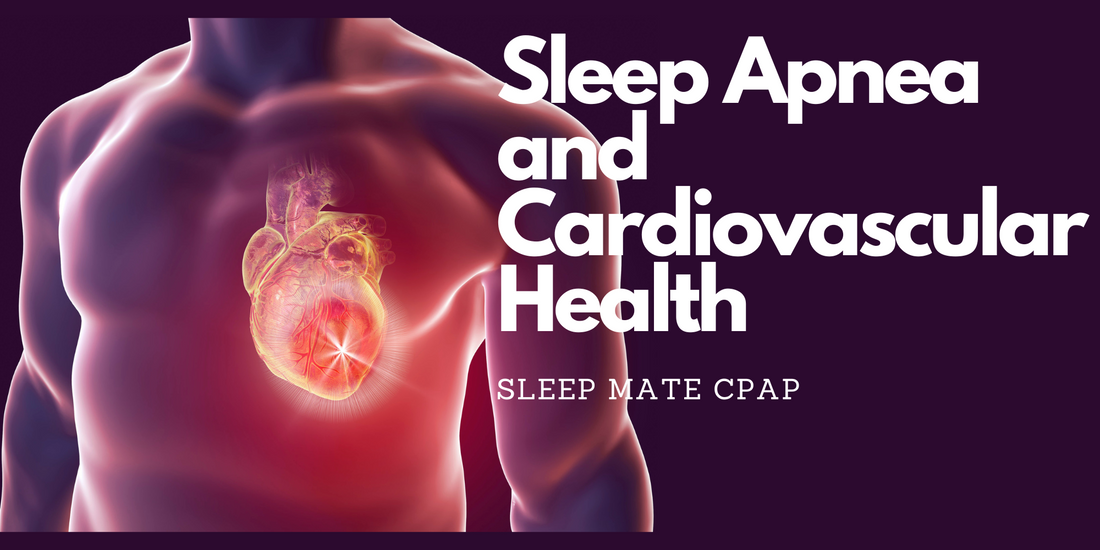
The Link Between Sleep Apnea and Cardiovascular Health: What You Need to Know
Sleep apnea is more than just a sleep disorder; it is a condition with far-reaching consequences, especially when it comes to your heart. Sleep apnea and cardiovascular health are closely connected. Untreated sleep apnea significantly increasing the risk of heart-related complications. In this comprehensive guide, we’ll explore this connection, the risks involved, and why early diagnosis and treatment are essential.
Understanding Sleep Apnea and Its Impact
Sleep apnea occurs when your breathing repeatedly stops and starts during sleep. There are three main types:
- Obstructive Sleep Apnea (OSA): The most common form, caused by the relaxation of throat muscles.
- Central Sleep Apnea: A less common type where the brain fails to send the proper signals to muscles that control breathing.
- Complex Sleep Apnea Syndrome: A combination of both obstructive and central sleep apnea.
Without treatment, sleep apnea disrupts your sleep cycles, leading to oxygen deprivation. Over time, this has a profound impact on your cardiovascular health.
Sleep Apnea and Cardiovascular Health
The relationship between sleep apnea and cardiovascular health is well-documented. Here’s how untreated sleep apnea can harm your heart:
1. Increased Blood Pressure
During apnea episodes, oxygen levels in the blood drop, causing your body to release stress hormones. These hormones raise blood pressure to improve oxygen flow, but sustained high blood pressure, or hypertension, can lead to long-term damage to the heart and arteries.
2. Elevated Risk of Heart Attack
Sleep apnea is linked to a higher likelihood of heart attacks. The frequent drops in oxygen levels put immense strain on the heart, especially during the night.
3. Development of Arrhythmias
Irregular heartbeats, or arrhythmias, are more common in individuals with sleep apnea. Oxygen deprivation can affect the heart’s electrical system, increasing the risk of dangerous arrhythmias such as atrial fibrillation.
4. Stroke
Sleep apnea significantly increases the risk of strokes. Oxygen deprivation, coupled with high blood pressure, creates the perfect storm for cerebrovascular issues.
5. Heart Failure
Over time, untreated sleep apnea can contribute to heart failure by overworking the heart and exacerbating existing conditions.
Diagnosis the First Step
The first and most important step in addressing sleep apnea and its impact on cardiovascular health is obtaining a proper diagnosis. Many individuals remain unaware of their condition, attributing symptoms like snoring or fatigue to stress or poor sleep habits. However, early detection is crucial for preventing serious health complications.
At SleepMate CPAP, we offer a convenient and reliable sleep apnea diagnostic service to help you identify the condition. Our diagnostic tools are designed to provide accurate results, enabling you to take the next steps toward treatment and improved health.
Who Is at Risk of sleep apnea and cardiovascular health?
Several factors increase the likelihood of developing both sleep apnea and cardiovascular issues:
- Obesity
- Smoking
- Diabetes
- Family history of heart disease
- Older age
- Sedentary lifestyle
If you fall into one or more of these categories, prioritizing your heart health and addressing sleep apnea is crucial.
Symptoms to Watch For
Because sleep apnea often occurs during sleep, many people remain unaware of the condition. Look out for these symptoms:
- Loud, persistent snoring
- Gasping or choking during sleep
- Daytime fatigue or sleepiness
- Morning headaches
- Difficulty concentrating
If you experience these symptoms, consider using our at home sleep study diagnostic service.
The Science Behind the Connection of sleep apnea and cardiovascular health
Numerous studies underscore the link between sleep apnea and cardiovascular health:
- The American Heart Association reports that up to 50% of individuals with heart failure or atrial fibrillation also have sleep apnea.
- Research from Harvard Health highlights that untreated sleep apnea increases the risk of cardiovascular death by up to five times.
- A study in the Journal of Clinical Sleep Medicine found that CPAP therapy can significantly reduce blood pressure in patients with sleep apnea.
These findings make it clear: addressing sleep apnea is not just about improving sleep but also about protecting your heart.
Treatment Options for Sleep Apnea
Thankfully, effective treatments are available to manage sleep apnea and its impact on cardiovascular health. Common options include:
- CPAP Therapy: Continuous Positive Airway Pressure (CPAP) machines keep your airways open during sleep, reducing apnea episodes.
- Lifestyle Changes: Losing weight, quitting smoking, and exercising regularly can improve sleep apnea symptoms.
- Surgery: In severe cases, surgical interventions to remove tissue or reposition structures may be necessary.
- Oral Appliances: Custom-fitted devices can help keep your airway open by repositioning your jaw or tongue.
Why Early Treatment Matters
Addressing sleep apnea early is crucial for maintaining your cardiovascular health. Untreated sleep apnea increases the risk of heart disease, stroke, and other life-threatening conditions. By seeking treatment, you can:
- Lower blood pressure
- Improve heart rhythm
- Reduce the risk of stroke
- Enhance overall quality of life
What You Can Do Today
If you suspect you have sleep apnea, take the following steps:
- Consult our Pharmacists: Schedule a sleep study to confirm the diagnosis.
- Explore CPAP Therapy: Visit SleepMate CPAP to find the right CPAP machine for your needs.
- Adopt Healthy Habits: Eat a balanced diet, exercise regularly, and manage stress to support both sleep and heart health.
Conclusion
The link between sleep apnea and cardiovascular health is undeniable. Untreated sleep apnea poses serious risks, but with early diagnosis and effective treatment, you can protect your heart and improve your overall well-being. Don’t let sleep apnea compromise your health. Take action today for a healthier tomorrow.
For expert advice, reliable diagnostics, and a wide range of CPAP products, visit SleepMate CPAP. Your journey to better sleep and a healthier heart starts here.

